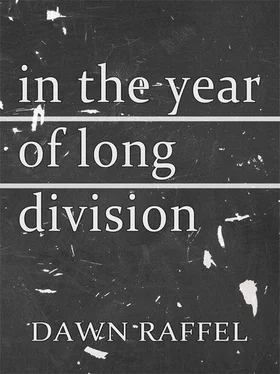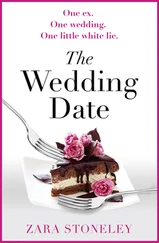We children are not children. We are sister and sister, face front and center, buttoned mother-of-pearl. Mother’s oven is Dutch. The rattle of the boil is a sound we sisters prefer to ignore. We are waiting on the weather, my sister says. We are waiting for a fit like a fine kid glove. We are waiting for a higher tide to roll in.
It is a hook my mother says she nailed herself.
An unrelated rumor has been hanging in the air.
My mother keeps a basket by the door with nothing in it. It is there for the season, my mother says. She says, Go and fetch your father. He is salting the beach.
A job is a job. This could not be simpler.
But my sister and I are slow and slowest. We are in the wrong year. Our father is never in the place we expect. Father sickness-and-health, he is chewing the breeze. He is checking what is greener on the other side. He is butter through our fingers. Gone.
The rumor is bearing on the burial mounds. It is the clatter of change. There is talk of heads of arrows switching hands up the Old Goat Road. Somebody is selling precious pennies, it is said, and crooked corn. Somebody is selling beads of sweat, a little Pepsi in a cup. Somebody is marking down the souvenir bones of Paul Bunyan and his blue ox, Babe.
We do not investigate ourselves.
The stitching in the kitchen says nothing, is only p’s and q’s, is out-of-date.
It is winter already and the ice is full of fish, my mother says. We have the recipes engraved on a laminated log. We have lanyards and all-purpose holiday plums. We have edible leaves. We have drawstring hoods. This is smart, my mother says. But we are winded and it smells like snow.
All the stiffs are frozen stiff, my sister says. She is waiting on tables that are empty. She is waiting on a headdress, a puff-puff, a tepee for two. My mother’s hair has turned to silver and we are scraping by.
I am making a crust. I am fluting the edge.
My father is sighted up the hill and in the road and on the lake. But it is never him. The party line is busy. There’s a message in a bottle. A ship is on a shore.
My sister has begun to misremember. In the interest of time, my sister says, she has started seeing double. She is slugging the port. She is carrying a tune south across the border.
My mother has a suitor with a range.
There is a legend on the map.
There is something boiling over.
There has been a drowning.
We have prints. We have a photo of the Mona Lisa on a ring for keys. This is not Chicago. We have cherries by the peck.
There are stars for lying under.
There are stones.
My sister is impossible to call. We have gone too far. We are no longer listed. They have changed the exchange. The poor old goat, my mother says, is gouty and spent.
But we are somewhere else. We are always somewhere else. We are in this plangent earth. We are going up the road. We are standing on the roof of the world, facing off.
GEESE came. Dark as the loam of fertile lands, they came, the sky incessant. In the hard fields bladed brown, no further crop would fill the woven horns of fall. The trees were plainly picked. The ridges of the soil held the feathers of the frost. Thick past marsh, low above farmland, the flat-lying places of rattly dwellings, clapboard dwellings, all dark clouds were geese. There were no formations.
“Hush,” a woman said.
“Patience,” a woman said.
A woman said, “Hope, look up.”
This was in the time of the Indian corn tied tight to doors with dry stalks. The doors had mats of husk. Dark jars filled the cellars. A pressure could be felt at the temples of the women. Beds were lumpy. Rooms were cold, the floors fast-whisked.
Men were in pursuit. The men had boots and firstborn sons. The sons had dogs to point. Meat was scarce. Skins cracked. Every kettle sang.
In the butter-lit kitchens, the women stood to do with hand and knife the things that women stood to do. The wind was in the curtains, sinkside. There were daughters in the leaves.
This is what the youngest child knew: The geese stirred talk. The hands of women floated. A mother was a woman whose rings caught a curious light.
Loose at a threshold, the child was a flicker — back of an ankle, under a step, awry, soft cheek to slat. She was damply jumpered. Her hair fell to curls of the shade of the ground, of wood, of the hair of her father’s chest. He had loaded his shotgun. The child quickened to muted noises, pulses in the walls.
A syllable could echo.
The father might have whispered.
The names of the child were the names of the dead. Out of the ether, into the night, the mother’s broken cries had flown.
“Junior,” a woman said.
“No,” the mother said. “Hope Hope.”
The windows were jimmied. The sheets were twice-boiled. A woman said, “Prudence.” The knees of a woman were reddened and scarred. There were moons in the floors. The rugs were rag, beaten. The violence of touch was at a hem, most stubbornly waddled to get to.
This was an issue of friction.
The child paid no mind; the women said Little Miss.
There were designated corners for speaking in tones.
Weaned she was, the women said. She was no rashy drooler, Miss Hope Hope. No gobby bib and teat. She was unrestful. Eyes to where she mightn’t ought to be, the women said. What a body would think!
There were speckles in the air.
The father of the child had licked a sturdy finger, raised it, tested for conditions. His was the smell of straps and hoods, of flannel — his, his skin. He had been brooding. His smells were in the quilts.
Fat pads were in nooks and in shadowy alcoves in all the abodes.
The daughters knelt to wax. They were tricky and preening. Nights, the daughters pursed their lips and stole. The dark was a gradation. Their frenzy was invisible. An index finger to a daughter smelt of brine. Their smocks smelt of earth. Under the nails of the daughters were splinters and crescents of blood.
The leanings of men, the women said, left stains. The ordering of sons was not reliable. Chairs rocked back dug ruts, the women said.
“Patience,” a man said.
Everybody waited on the sky’s murky bounty.
HUSK, sheaf, reed, twig, thread — the women wove. They hummed. Blood was their relation. Callused and tender, thickened to a split, the hands would not relent.
Picture the gravy, the women said, the wine, the wings. Think of the abundance to preserve. Think of the steam! How the marrow would glisten!
The daughters scavenged crusts.
The women laid cloth. Horn and grace, basket and music, russet and candle; palm, palm, hymn — the service would shine, the women said. Under the tables, nestling paws-to-toes, loyal, the dogs would have plenty.
“Faith, yes, do you hear?” a woman said.
The women were named for the things not seen.
Drawing with the shadows was the province of the child. Fingers were her implement, laced, her thumbs, all of the whole of herself. She was as tall as the knobs. Adorable texture was what she was — the nub of a mother’s chenille, the warp, the glowy, got-to shock. She was a wick. She was soft as paraffin sealing over jars. Hers was the searing incision. She was a beam, a funnel for the light. She was thrashing and thrashing on the rafters. She was enormous.
“Mama?” she said.
A woman said, “Hope?”
The names of the daughters were doubled.
A handle was braided.
“Hope?” a woman said. “Hope Hope?”
Report was expected.
The daughters were somewhere, a rustle and trill.
Patience was called for.
“Mama,” the child said. “Look.”
“Herself is in the door,” a woman said.
The youngest child’s mother sucked the color from a long, wet cut.
Читать дальше












